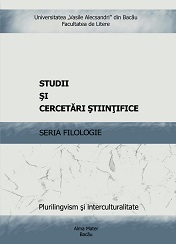ATYPICAL LANGUAGE STANDARDS IN ARGUMENTATION
ATYPICAL LANGUAGE STANDARDS IN ARGUMENTATION
Author(s): Mariana TîrnăuceanuSubject(s): Language and Literature Studies, Communication studies, Phonetics / Phonology, Philology, Theory of Literature
Published by: Editura Alma Mater
Keywords: persuasive strategies; argumentative principles; non-standard phonological codes; intricate linguistic patterns; rhetorical use of grammar and vocabulary;
Summary/Abstract: In argumentative types of spoken discourse or in persuasive pieces of dialogues, together with the specific strategies used, the protagonists may have personal linguistic choices mirrored in morphological patterns and sentence structures. The so much recommended lexical and grammatical coherence and cohesion might face unpredictability. Fluency, accuracy, well-elaborated linguistic patterns may encounter recurrent intricate or confusing structures. Highly specialised idioms may be employed along with significant vocabulary items, and standard phonological codes (i.e. register, articulation, stress) may be broken. Both vocabulary and grammar may play rhetorical and semantic functions. Message (expressed in an explicit or implicit way) is transmitted to the audience / interlocutor who is challenged to figure out the intended meanings and to resolve ambiguity. Such potential interpretations could match the real message or not, but the feedback shows whether the message was properly understood and proves the abilities of the interlocutor to process information and to react accordingly; in other words, the feedback shows how successful the argument was. As for the lack of reaction, could it really, and always, signify anything?
Journal: Studii și cercetări științifice. Seria filologie
- Issue Year: 2019
- Issue No: 41
- Page Range: 35-40
- Page Count: 5
- Language: English

